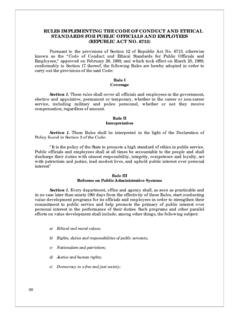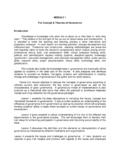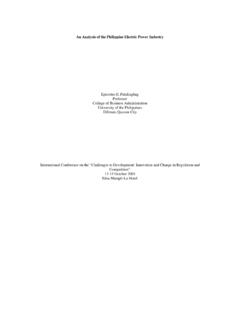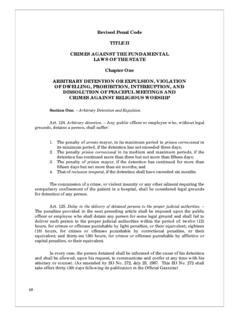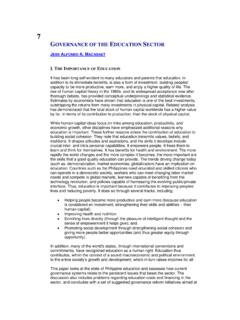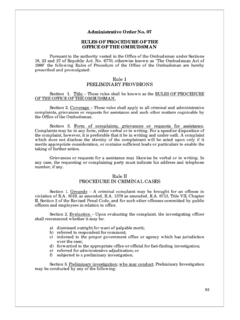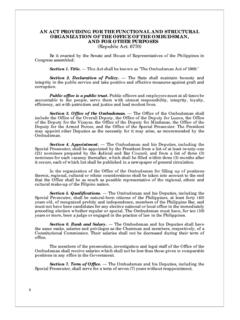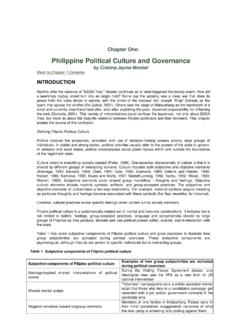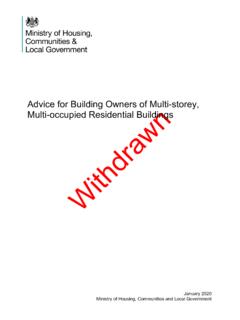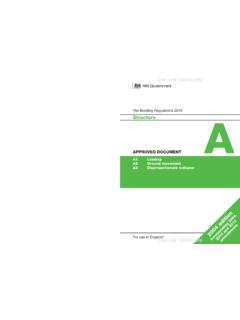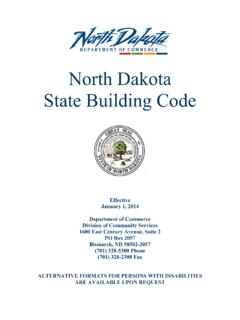Transcription of Building the Philippine Political Party System
1 1 Building the Philippine Political Party System Democracy is defined as a government of the people, by the people, and for the people. No true democracy can exist without a working Political Party System that is built on valid Political platforms/policies that intend to foster progress and development. However, the Political situation in the Philippines, as well as its Political institutions, makes Philippine Political parties more of a detriment rather than a boost to the country's development. One major factor that makes our Political parties weak is the dependence of Political parties on personalities rather than on issues and Political platforms. Traditional politicians only use Political Parties as financial vehicles to win elections. There is absence of Party loyalty as well as adherence to the Party 's ideological principles, platforms, and programs.
2 There is, arguably, the absence of a real and democratic Political Party System in the country. There is an obvious need for reforms in our Political Party System , reforms that would lead to the reduction or even eventual eradication of graft and corruption in Philippine politics. There is a need for a legal, institutionalized framework to govern our System of Political parties. We need a strong Political Party System . 2 What is the Political Party Development Act? The Political Party Development Act is a vital part of the package of Political and electoral reforms that the country needs to undertake. It aims to strengthen the Political Party System in order to develop genuine Political development and democratization. The proposed act intends to address the well-entrenched patronage System ; to promote transparency and accountability through institutionalization of reforms in campaign financing; and to veer away from the traditional personality-based politics by upholding Party loyalty and adherence to Political platforms and ideology.
3 The act was first drafted in 2002 and endorsed by the major Political parties in the first-ever Philippine Political Party Conference, chaired by then-Speaker and Lakas-NUCD chairman Jose de Venecia. Election reform advocates participated in the drafting and endorsed the original bill, and later lobbied with government to pass it. Then House Speaker Jose De Venecia primarily authored the bill in the House of Representatives, while Senator Edgardo Angara likewise filed a senate version of the bill. However, the unity for the bill started to crumble when GMA announced her candidacy for the 2004 presidential elections. The presidential legitimacy crisis prevented developments on the bill despite GMA s own endorsement in her 10-point legacy program and its inclusion in the Medium-Term Development Program.
4 Meanwhile, other representatives in the House filed similar bills in the 14th congress and they were all consolidated 3 into House Bill 3655 or also known as the Political Party Development Act of 2008. HB 3655 has already passed the third reading by the 14th Congress. However, objections coming from Party -list representatives and other minority members have led to the bill s recall back to the second reading and eventual non-passage. With lessons from the recently concluded 2010 elections, it is imp erative that such measure be enacted. The 2010 National and Local elections were dubbed as the most expensive in terms of campaign spending; however, it also disproved the belief that money can buy any seat in the government. The current situation under the Aquino government opened once more the possibility for passing the bill because of the urgency to strengthen the weakened democratic institutions of the country.
5 In the 15th congress, efforts to strengthen the Political Party System are enshrined in House and Senate bills entitled The Political Party Development Act of 2010. Senate Bills 51 and 607 were filed by Senators Edgardo Angara and Jinggoy Estrada, respectively. House Bills 49, 403, and 159 were also filed with the same topics by Representatives Rufus Rodriguez, Maximo Rodriguez Jr., Juan Edgardo Angara, and Arthur Yap, respectively, and Rep. Raymond Democrito Mendoza also co-authored in the consolidated bill. The various bills on the subject matter have been consolidated at the committee level into a substitute bill at both the House of Representatives and the Senate and are due for adoption by the respective committees in both Houses as committee reports.
6 4 DECLARATION A Political Party is a group of individuals organized to advance an ideology, vision, or program with the intention to influence the government through participation in elections. A Political Party engenders the principles and issues espoused by its members as part of democratic participation. It also becomes the training ground of leaders and Party workers, the embodiment of the aspirations of its constituency, and the organizational machinery for electoral campaigns and governance. A working Political Party System that fosters platform over the traditional personality-oriented politics would yield a much greater impact in societal development as policies implemented in governance can be institutionalized or used on a long-term basis. The Political Party Development Bill aims to strengthen the System of Political parties by: (1) Upholding Party loyalty and adherence to ideological principles, platforms, and programs by penalizing turncoatism; (2) Reducing cases of graft and corruption by regulating campaign financing through transparent mechanisms to level the playing field; and (3) Professionalizing of Political Parties through State Subsidy by supporting them to become effective agents of democracy.
7 5 Through the State Subsidy Fund, the pending bill encourages Party development activities other than campaign activities conducted during an election year. In a non-election year, funds may be used for (a) Party administration, recruitment, and civic education; (b) research and policy development; (c) education and training of members; (d) institution Building and constituent outreach program; and (e) other reasonable logistical and operational expenses that are essential in strengthening the Party . By enacting this law, we strengthen Philippine democracy by heeding the voice of the people for democratic participation in our electoral processes and in democratic governance. I. Political TURNCOATISM Political Turncoatism is the act of changing Party affiliation by a candidate.
8 It is deeply imbedded in the country s Political culture as most aspiring politicians only use Political parties as financial vehicles and machinery during elections. The Political Party Development Bill seeks to promote Party loyalty and adherence to Party objectives by discouraging any member of a Political Party from changing Party affiliation before an election, or if elected, after an election. A significant percentage of realignments occur after candidates have identified the winnable or ruling Party . It means that the shifting of Party affiliation is mainly rooted on Political advantages rather than on conviction. 6 II. CAMPAIGN FINANCE Government regulation of campaign financing in both campaign contributions and campaign expenditures has always been a thorny issue in Philippine elections.
9 Despite existing legal provisions that aim to level the playing field for those who wish to run for office, Political parties and candidates still blatantly go beyond these restrictions based on the belief that money alone can buy any Political office. Transparent and effective mechanisms are indispensable to level the playing field among candidates and Political parties during elections. The proposed bill intends to strictly regulate campaign contributions, on the one hand, and campaign expenditures, on the other hand. It will institute stiffer penalties for violators and it proposes to strengthen the role of COMELEC by creating a department within the commission that is tasked to supervise and regulate campaign financing. In an election, the people express their will and delegate their power to elected officials.
10 They entrust elected leaders to govern the state through policies that would reflect their will. As such, choosing leaders should be based on a process that is free from intimidation or influence of money. The proposed bill hopes to enable both the candidates and citizen-voters to view elections as a democratic exercise and not as a form of business to amass wealth. 7 Allowable Party Development Expenditures: 1. Party Administration, recruitment, and civic education 2. Research and Policy Development 3. Education and Training of members 4. Institution Building and constituent outreach program 5. Other reasonable logistical and operational expenses that are essential in strengthening the Party . Allowable Campaign Expenditures: 1. Operating expenses of the part, which may include hiring of personnel, professional secretariat, setting up of headquarters, and other relevant expenditures.
